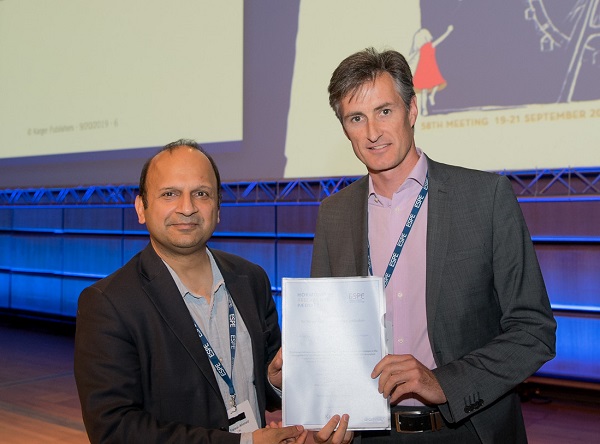Prof. Dr. Wolfang Högler received two awards in recognition of outstanding research.

In addition to a scientific award presented by the Austrian Society for Pediatrics and Adolescent Medicine (ÖGKJ), the JKU researcher at the Faculty of Medicine and director of the Department of Pediatrics and Adolescent Medicine at the Kepler University Hospital also received the Best Paper Award by the journal "Hormone Research in Paediatrics".
At its annual conference, the ÖGKJ presents science awards in recognition of outstanding publications from the previous year. The respective publication’s impact factor is decisive when selecting the award winners. This year, Prof. Dr. Wolfgang Högler was presented with the science award in the category of "Clinical Work".
Prof. Högler’s paper "Osteonecrosis of the Jaw and Rebound Hypercalcemia in Young People Treated with Denosumab for Giant Cell Tumor of Bone" focuses on the severe side effects of the drug Denosumab which is used to treat giant bone cell tumors. The paper looks at the dangers of treating adolescents with the same doses of medication as when treating adults and calls for tumor protocols adapted to patient weight and follow-up monitoring to prevent severe complications such as jaw osteonecrosis, high calcium levels, and kidney damage.
The European Society of Paediatric Endocrinology (ESPE) also selected a publication in the journal "Hormone Research in Paediatrics" for the 2018 Best Paper award.
The paper focuses on a completely new type of hormone replacement therapy for patients who have hypoparathyroidism (when the body does not produce enough parathyroid hormone, leading to a dangerous drop in serum calcium levels). When this happens, the risk of cerebral seizures, convulsions (tetany), and cardiac arrhythmia rises. Depending on the cause, hypoparathyroidism is sometimes very difficult to treat. Högler introduced a treatment using a continuous subcutaneous infusion (pump) in which an insulin pump (normally used for diabetic patients) contains parathyroid hormone instead. This maintains the patient’s calcium levels within the normal range and increases their quality of life (fewer lapses, seizures and hospital stays). The paper was written in collaboration with the Hospital Bicetre in Paris.








